- Author: Christine Casey
Like all animals, bees need food, water, and shelter. Most insects get all the water they need from their food: think of a caterpillar that feeds on plant leaves, which are mostly water. However, the pollen and nectar that constitute a bee's diet don't contain much moisture, so bees must have a water source. As the weather warms and foraging activity picks up, honey bees will start looking for water as well as pollen and nectar.
Honey bees are good learners, and once they find a water supply they will return regularly. Water is so important that foragers will do the waggle dance to direct hive mates to water sources just as they will for flowers. So to direct bees to the water you want them to use, it's important to provide attractive sources early in the year (i.e. now!) so they will learn these rather than the places you don't want them, such as a swimming pool.
So just what is a good water source? Here are some guidelines:
Accessible to bees
Bees can't swim! They must be able to stand where it's dry and drink. Good systems include shallow bird baths or pot bottoms filled with water and pebbles or corks. These allow the bees to stand and drink; they'll generally dry out too quickly for mosquitoes to be an issue. If your water source is a pond, Bacillus thuringiensis israelensis may be used for mosquito control as it's harmless to bees. At the Haven, we create 'pots' using coiled soaker hoses. Connected to a timer-controlled water supply, these are a great way to efficiently deliver water in bee-sized droplets. I provided construction details for this in a previous post.
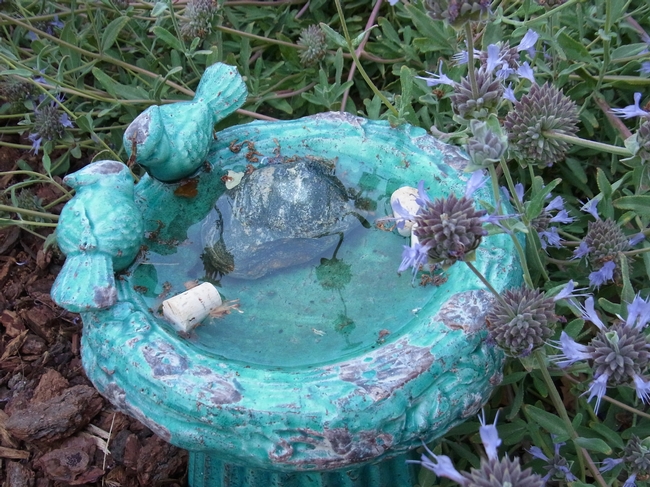
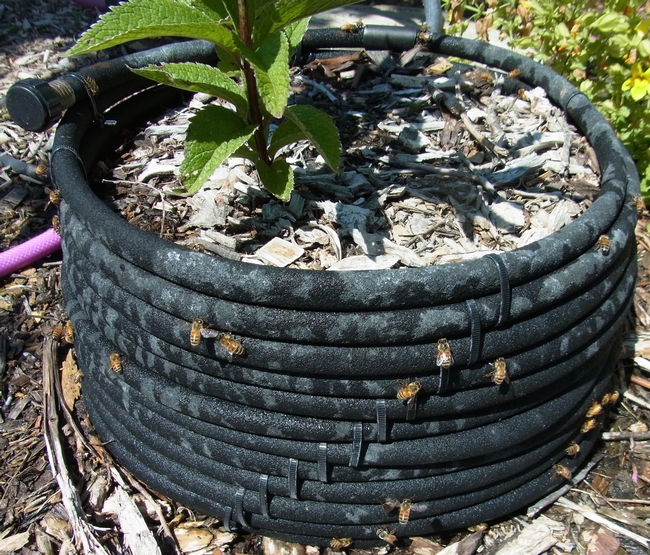
Nutritious for bees
Water needs to be nutritious? Surely bees need the same fresh, clean water that you or I might want? It turns out that water is an important route for bees to obtain essential nutrients. Butler (J. Experimental Biology, 1940, (17):253-261) coined the term 'dirty water' to refer to water containing nutrients. Probably because in the agricultural areas of Great Britain where he observed bees, they frequented areas we might consider undesirable. As he stated in his paper,
"It is well known that honeybees tend to collect water from many undesirable sources, such as rain-water gutters that are choked with decaying organic matter, on the puddles that form on the top of cow dung and sewage effluent, rather than from a source of clean water provided in the apiary for their use."
He performed chemical analysis of the water at these sites and found it to be high in various nutrients that were leaching from the organic material. Water with high sodium chloride (yes, table salt) seemed to be the source preferred by bees. A previous study (Hertz, Z. Vergl. Physiol., 1935, (21):463) suggested that bees used olfactory cues to located these preferred sources. To test this, Butler washed preferred water using activated charcoal and found that bees were unable to distinguish between the washed preferred water and distilled water. This confirmed Hertz' theory that odor cues are used to locate mineral-rich water. The take home from this? Don't place your water source near highly scented plants, and let leaves and algae sit in your bee water source.
More recent work by Bonoan et al. (Ecol. Entomol., 2017, (42):195-201) looked at drinking water as a source of micronutrients for bees. Honey bees were allowed to forage freely in a meadow and were provided water sources with varying chemical components. As with Butler, during much of the year they found that bees had a strong preference for sodium-rich water, regardless of plant diet. In the fall, however, when pollen is scarce, they showed a preference for water sources containing calcium, magnesium, and potassium, all of which are found in pollen. This demonstrated that honey bees have the ability to switch water sources to compensate for dietary nutrient deficiencies.
Plants as water sources
I mentioned earlier that the plant products consumed by bees -- pollen and nectar -- aren't good sources of water. Plants can be an indirect source, though. In a garden with overhead irrigation or large amounts of dew, water can sit for several hours on leaves that are covered with dense hairs. I've shown two examples from the Haven below. Since overhead watering can promote disease and waste water, try giving plants like these a quick wash from the hose so they'll do double duty as nectar and water sources.
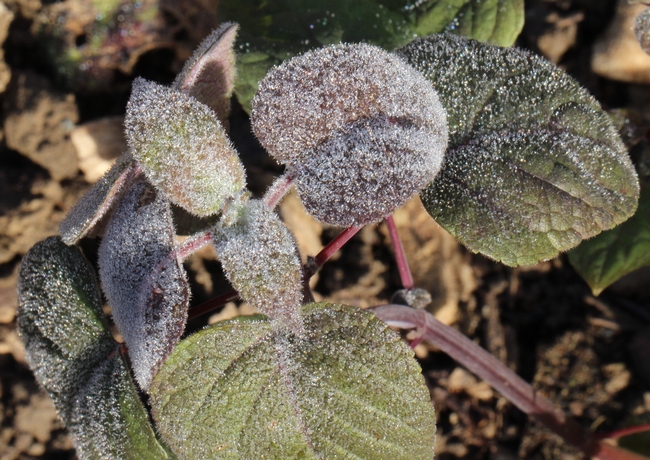
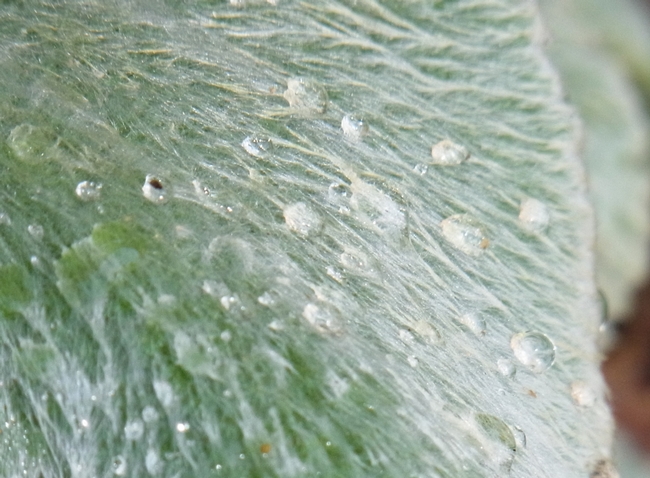
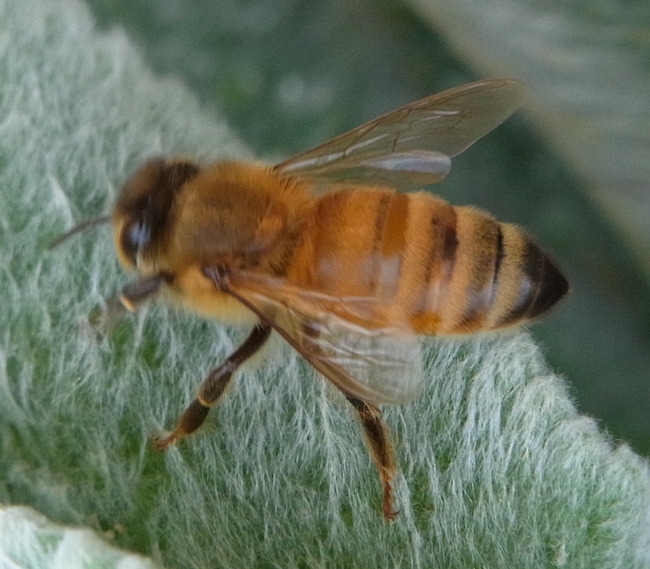


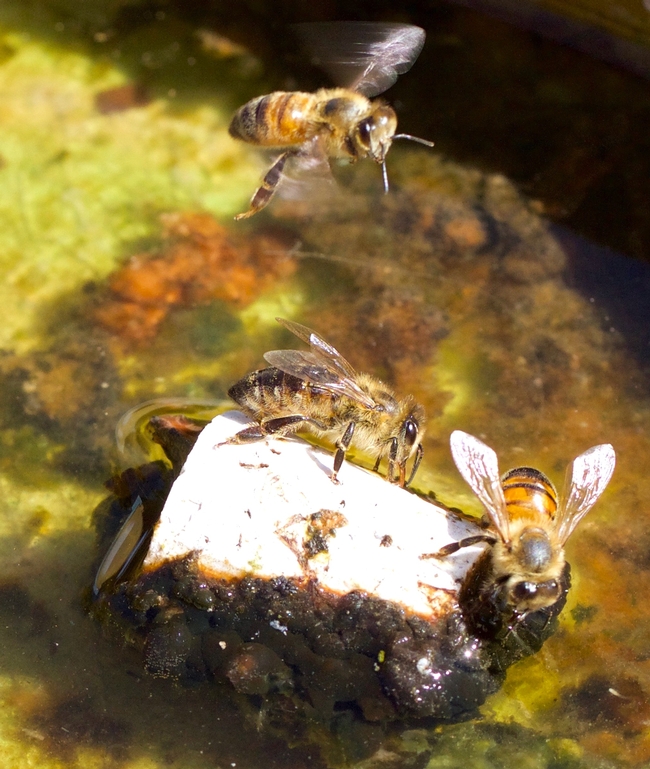


Glad you found this interesting. There are so many fascinating animals and plants all around us if we know what to look for!
You are observing muscle contraction that creates the suction which allows water to enter the digestive system. Think about how humans drink with a straw...we contract the muscles in our mouth to draw liquid into the straw.
This Wikipedia page has a lot of information about bee muscles: https://en.wikipedia.org/wiki/Insect_physiology
Bees will learn where their water supply is located, so it is difficult to get them to move this late in the year. You can 'train' them to use a supply in a certain location by putting it out first, early in the year, before the water bowls go out at the dog park.
Be sure your shallow dish has perches, such as small rocks, for them to use.
water area off our deck. They come from to opposite directions and the different hives share the water. It's like a busy airport and poetry combined. The bees are much less territorial away from the hive, so we can actually walk right up to it and study up close without fear of being stung. Mostly though we watch them from the deck table. Sometimes my wife saves a drowning bee. Yesterday I looked in the water we use empty pie pans and a bird feeder. There is algae and yesterday I saw a teeny tiny tadpoles. Now I've read this article which is a great article and understand now that the algae in the little teeny tiny tadpoles are good for the bees. How great is that! Great job on this article! Okay
That sounds like great fun to watch. Glad your hives are doing well.
I agree!
I hope you're enjoying watching the bees at your water station!
South Dakota and Nebraska the wind chill is -40s. What he should do to keep his bees alive through the winter? I don’t want him to give up.. Thank you ????
Please have your friend contact the Great Plains Master Beekeeper program: https://gpmb.unl.edu/